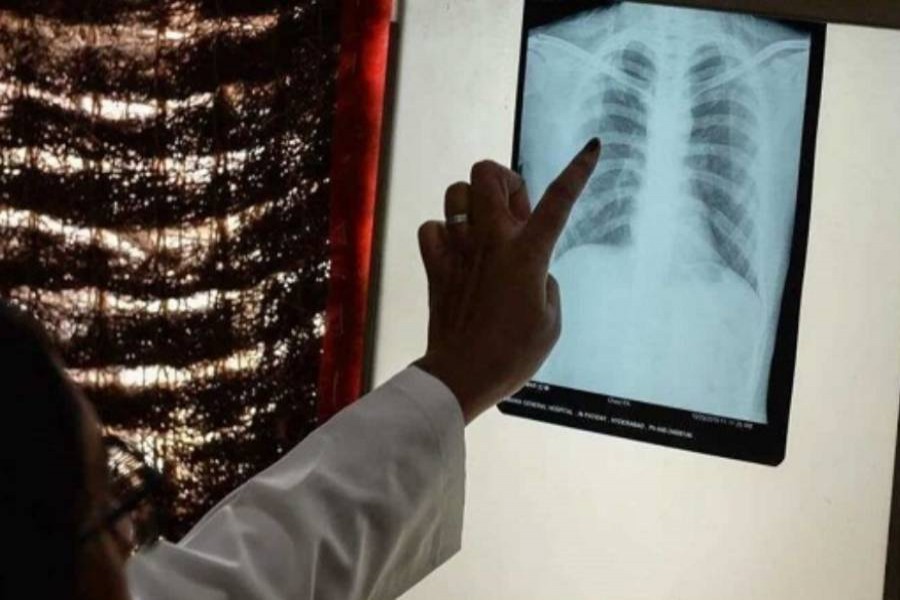Nearly 9.9 per cent of household contacts had TB-like symptoms and subsequently, 6.7 per cent were diagnosed with TB, thus indicating an alarming and higher prevalence of Tuberculosis in Bangladesh, the latest study finds.
Moreover, screening 178 household contacts of Multidrug-resistant TB (MDR TB) patients could result in the detection of one person with TB.
A total of 355 household contacts of 93 MDR-TB patients were interviewed in Dhaka, the cross-sectional study, which is conducted from November 2020 to October 2021, reveals.
The research findings were disclosed at a dissemination seminar to share preliminary findings of four studies on tuberculosis by four fellows who received fellowship on TB held at icddr,b’s headquarters in the capital on Thursday.
The event was organised by the United States Agency for International Development (USAID) Alliance for Combating TB in Bangladesh (ACTB) activity, implemented by icddr,b.
The event was graced by the Chief Guest Dr. Md. Anwar Hossain Howlader, Secretary, Health Services Division, Ministry of Health and Family Welfare (MOHFW), and attended by Ms. Miranda Beckman, Acting Office Director, Office of Population, Health and Nutrition USAID/Bangladesh; Dr.Tahmeed Ahmed, Executive Director, icddr,band Dr. Firdausi Qadri, Senior Director, Infectious Diseases Division, icddr,b.
Dr.Azizur Rahman Sharaque, MBBS, MPH, BSMMU was one of the four fellows who presented his findings on the prevalence of drug-sensitive and drug-resistant TB among household contacts of multidrug-resistant TB (MDR-TB) patients in Dhaka.
Dr. Fariha Alam Mihika, MBBS, MPH, BSMMU presented her study on the impact of the COVID-19 pandemic on pulmonary TB control services in selected areas of Dhaka.
In a cross-sectional study conducted between November and December 2021, the researcher interviewed service providers and TB patients from six upazila health complexes.
She found that TB screening was significantly affected (between 16 per cent-35 per cent) and service receivers reported a lack of transportation (95 per cent) due to the national lockdown and fear of getting Covid-19 (77 per cent) as major challenges for screening.
There were many challenges for the service providers, including lack of human resources, increased workload, and being infected with COVID-19, as per the study.
Dr. Md. Imtiaz Uddin, MBBS, MPH, NIPSOM presented his study on the barriers to the detection of childhood tuberculosis in Dhaka.
In the qualitative study, the researcher interviewed 32 children with TB, their parents, and service providers.
The study revealed that major barriers to the detection of childhood TB include social stigma, misconception and lack of knowledge in the community about childhood TB, insufficient contact investigation, limited availability of testing, inadequate human resources and financial constraints.
Ms. Momtaz Begum, MPH, NIPSOM presented her study on the knowledge and attitude of healthcare workers and patients on MDR-TB. From January to December 2021, in a cross-sectional study, the researcher interviewed 232 participants comprising 101 healthcare workers and 131 patients.
The study revealed that 93 per cent of doctors had good knowledge of MDR-TB, while about 69 per cent of nurses and 82 per cent of patients had a fair knowledge of the issue.
On the occasion, Dr. Md Anwar Hossain Howlader said these researches highlight the importance of conducting research and translation of research findings in programme delivery.
This will, in turn, help us achieve the SDG goals and improve the TB situation in Bangladesh, he added.
In her remarks, Ms. Miranda Beckman said, “There is a lot of stigma around TB. This is great to see researchers’ findings such as raising awareness, and detecting and treating TB can reduce mortality. Look at the speed of COVID-19 vaccine, treatment, all the research and new knowledge that came out due to all the attention directed to COVID-19. We can do that to TB if we can invest that level of funding, interest, and attention to TB.”
Dr. Tahmeed Ahmed commended the work of the fellows and emphasized the importance of fellowship.
The studies are the outcome of a collaboration between icddr,b-led USAID’s ACTB, BSMMU, and NIPSOM. Four fellowships were awarded to post-graduate physicians/students conducting their research/theses on tuberculosis. It offered a unique opportunity to prepare next-generation researchers on TB issues.


